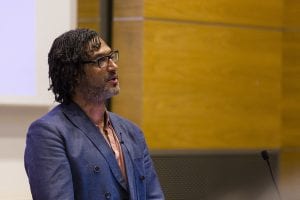David Olusoga’s 2018 Cities Imaginaries lecture on the UK’s ‘Orwellian’ housing situation
By ucyow3c, on 25 May 2018
Written by Jordan Rowe, Centre Manager, UCL Urban Laboratory
Historian, broadcaster and film-maker David Olusoga was invited to deliver the 2018 edition of the annual Cities Imaginaries lecture at UCL Urban Laboratory on 22 May.
In some ways, the lecture was a return to UCL for the Civilisations host, who collaborated extensively with academics in UCL History researching the legacies of British slave‑ownership, as part of a documentary series broadcast on the BBC in 2015.

At the UCL Urban Laboratory, Olusoga offered a thought-provoking historical journey through periods of housing crisis in the UK – contending that the problem is hard-wired into our cities. He questioned whether today’s levels of housing inequality and poverty may even eclipse that seen in the past.
Usually careful not to band around terms such as ‘Victorian’ or ‘Dickensian’, Olusoga made a point of mentioning that a comparison between our current situation and the Victorian era would be unfair, as we’re now at a point which is worse than that. (more…)
 Close
Close


 As part of the
As part of the 
